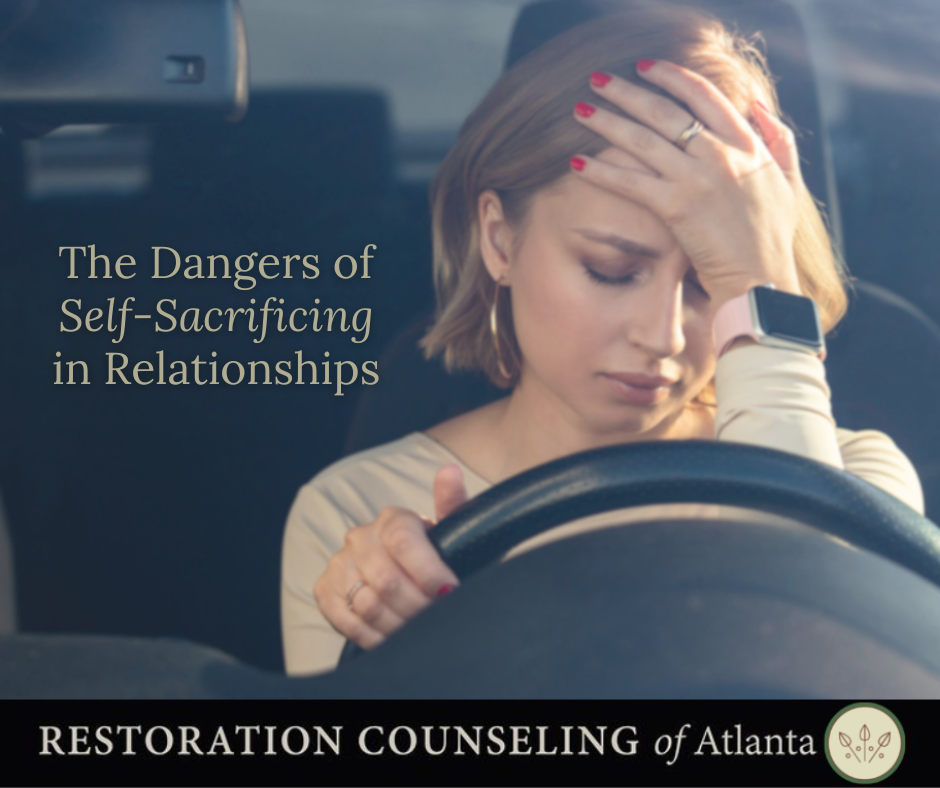Close relationships require sacrifice. Research has shown that couples are happier and more likely to remain in their relationships if the partners are willing to sacrifice for each other (Gordon, 2012). Sometimes the sacrifice is life-changing, such as deciding to change jobs to better support your family; other times it might be something small and mundane, such as going to see the movie they want instead of the one you would have chosen.
Research by social psychologists suggests that sacrificing for someone you love may show them you care and may even make you feel good about yourself. This aligns with research by Desar (2013) who wrote: “Our gut impulse is in fact to make daily sacrifices in close relationships.” But studies also reveal that if you find yourself always being the one who sacrifices or feel forced to make a sacrifice, then you could be doing more harm than good.
The Cost of Self-Sacrifice
Emotional Exhaustion
Self-sacrifice can lead to significant emotional exhaustion. Individuals who prioritize the needs of others over their own may find themselves feeling drained and overwhelmed. The constant demand to care for others can diminish your emotional reserves, resulting in burnout. Emotional exhaustion can manifest as irritability, anxiety, and feelings of helplessness, impacting not only your well-being but also your relationships.
Resentment and Frustration
Over time, self-sacrificing behavior can foster feelings of resentment. When you continuously give without receiving, you may start to feel unappreciated or taken for granted. The lack of appreciation is sometimes perceived as intentional; however, individuals often overestimate how much they do in the relationship, while underestimating how much their partners do. Meaning that your resentment may be about not getting the credit you feel you deserve, though the other person may not even be aware of your sacrificial efforts (Totenhagen, et al, 2013). Resentment is dangerous in relationships because it can create a rift, leading to conflicts and misunderstandings. Instead of fostering the closeness you wish, self-sacrifice can breed bitterness, which may push loved ones away rather than draw them closer.
Loss of Identity
Another significant risk of self-sacrifice is the potential loss of identity. When you define yourself primarily through your relationships and the sacrifices you make for others, you may lose sight of who you are as an individual. Your personal desires, goals, and interests may take a backseat, leading to feelings of emptiness and disconnection. A strong sense of self is crucial for healthy relationships, and neglecting yourself can hinder your ability to engage meaningfully with others.
Physical Health Consequences
The emotional toll of self-sacrifice can also manifest physically. Chronic stress from neglecting your own needs can lead to various health issues, including headaches, fatigue, digestive problems, and a weakened immune system. Over time, this can result in more serious health conditions, affecting not just your personal well-being but also your ability to care for others effectively.
The Influence of Christianity on Self-Sacrifice
In many Christian teachings, self-sacrifice is often viewed as a virtue. The Bible emphasizes love, compassion, and service to others, which can sometimes lead individuals to adopt a self-sacrificial mindset. It is no wonder that people get confused when self-sacrificing leads to problems in their relationships—it is supposed to be the greatest of gifts as said in John 15:13: “Greater love has no one than this, that someone lay down his life for his friends.”
Or Philippians 2-4: “Do nothing from selfish ambition or conceit, but in humility count others more significant than yourselves. Let each of you look not only to his own interests, but also to the interests of others.”
Verses like Mark 12:31, “Love your neighbor as yourself,” highlight the importance of caring for others. However, this can lead to an imbalance where individuals neglect their own needs in the name of faith and service.
The Balance Between Love and Self-Care
While Christianity promotes altruism and service, it also emphasizes the importance of loving oneself. The second part of the commandment in Mark 12:31 suggests that you cannot effectively love others if you do not love yourself first. This principle is critical to understanding the dangers of self-sacrifice. When individuals ignore their own needs, they risk not only their well-being but also the quality of their service to others.
Guilt and Shame
Many Christians struggle with feelings of guilt and shame when they choose to practice self-care. They may feel that prioritizing their own needs is selfish or unchristian, leading to a cycle of self-neglect. This guilt can make it challenging to set boundaries, as individuals may feel compelled to overextend themselves for fear of letting others down, not fulfilling their perceived obligations, or not being “good Christians.”
Understand Your Motivation for Self-Sacrifice
Are you sacrificing to support the other person or are you trying to avoid conflict? According to Gordon (2012), “sacrifices motivated by avoidance can undermine happiness and satisfaction in a relationship.” This behavior builds feelings of dissatisfaction as opposed to “approach-motivated” sacrifice, meaning it is for the collective wellbeing of the relationship or in support of your partner’s dreams, which builds trust and happiness.
Along similar lines, ask yourself whether your sacrifice was motivated by a desire to help your partner—or to hold the sacrifice over their head. “Psychologist Aleksandr Kogan has shown that genuine helping is healthy, but using sacrifice as a bargaining chip in your relationship may lead to resentment from your partner” (Gordon, 2012).
How to Not Over-Sacrifice Boundaries!
- Set healthy boundaries- Understand your limits, reflect on your needs, and identify triggers that push you beyond your limits
- Communicate your boundaries using assertive “I” statements
- Be direct and honest, both with yourself and with others
- Learn to say NO! Remember that you can offer alternatives to meet them in the middle
Tips for Better Boundaries
- Identify Your Priorities: Take time to reflect on what matters most to you. Write down your top priorities and ensure your commitments align with these values.
- Set Specific Times for Help: Establish specific times in your schedule when you are available to support others. This allows you to manage your time and energy more effectively while still being present for those who need you.
- Limit Your Availability: Be mindful of how much time you dedicate to others. If you notice that your schedule is becoming too packed, reevaluate your commitments.
- Recognize Guilt: It’s natural to feel guilty when you set boundaries. Acknowledge these feelings but remind yourself that prioritizing your well-being is crucial for healthy relationships.
- Be Consistent: Once you set boundaries, it’s essential to stick to them. Consistency reinforces your commitment to your own needs and helps others understand your limits.
- Look for Ways to Negotiate: Find a compromise that satisfies some of what both of you want, such as going to his restaurant then seeing the movie you choose.
The Balance of Giving and Receiving
A healthy relationship is built on a foundation of mutual support, where both partners feel valued and heard. Striking a balance between giving and receiving is crucial for fostering healthy connections. While it’s essential to support those you love, it’s equally important to allow others to support you.
While the teachings of Christianity emphasize the importance of love and service, they also highlight the need for self-love and care, for you are a child of His too. By establishing healthy boundaries and prioritizing self-care, you can create more balanced relationships that honor both your needs and those of others.
References
Desar, L. (2013). The truth about sacrifice: Is our first impulse to be selfless? PsychologyToday. Retrieved from: The Truth About Sacrifice | Psychology Today
Gordon, A.M. (2012). When are you sacrificing too much in your relationship? Greater Good Magazine. Retrieved from:
https://greatergood.berkeley.edu/article/item/when_are_you_sacrificing_too_much _in_your_relationship
OpenAI. (2024). ChatGPT 4o mini. https://chatgpt.com
Totenhagen, C. J., Curran, M. A., Serido, J., & Butler, E. A. (2013). Good days, bad days: Do sacrifices improve relationship quality? Journal of Social and Personal Relationships, 30(7), 881-900. https://doi.org/10.1177/0265407512472475

Written by Paige Santmyer, MA LPC NCC CCATP
Roswell location
paige@restorationcounselingatl.com, ext. 157
Paige provides counseling to adults ages 18+ experiencing anxiety, depression, relationship issues, parenting struggles, and life transitions. She uses a personalized approach of Client-Centered Therapy and Relational Psychoanalysis, as well as techniques from Cognitive Behavioral Therapy (CBT), Positive Psychology, and Exposure and Response Prevention (ERP). She has a certificate in both anxiety and trauma treatment.

